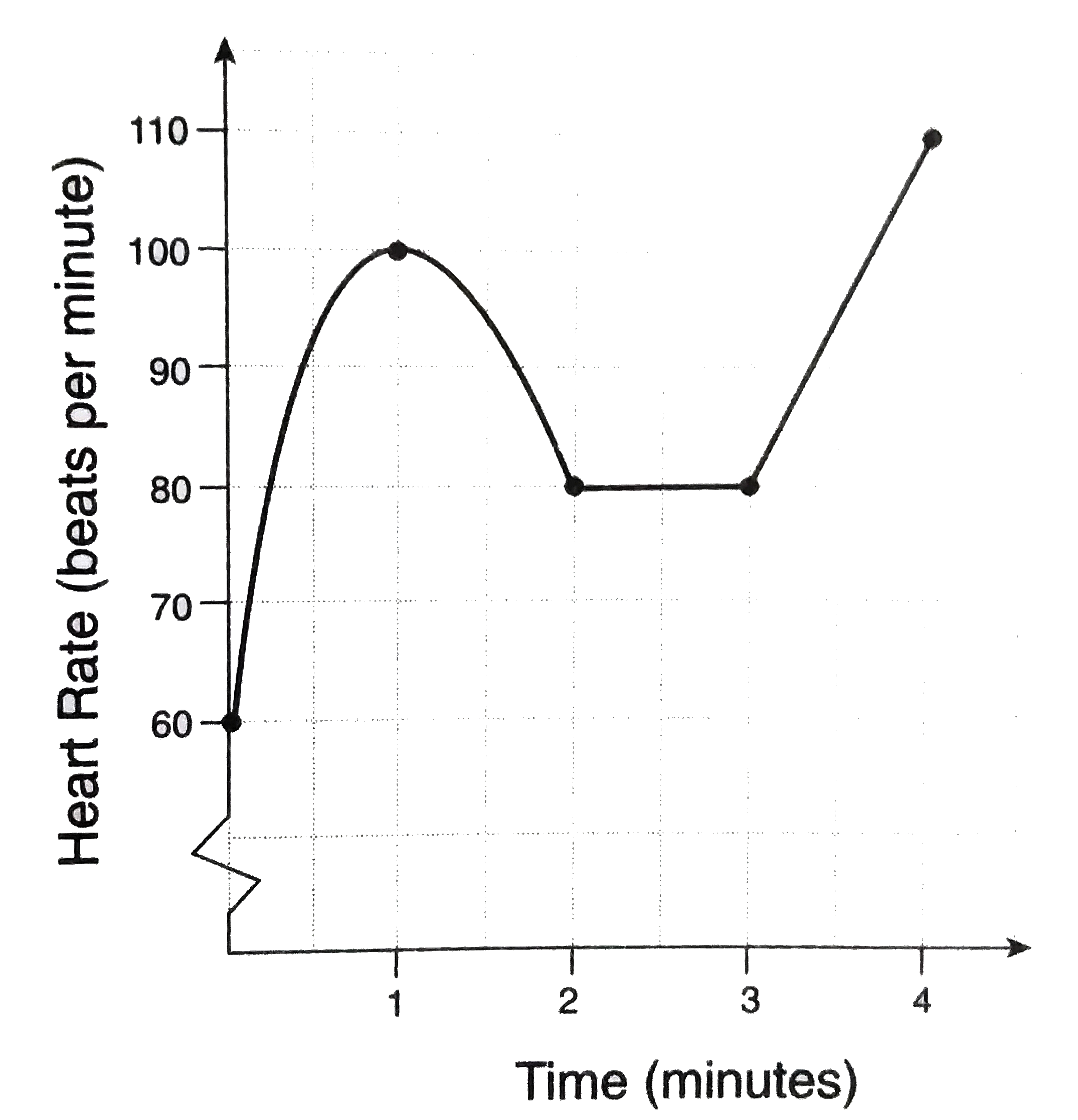
Question 13 and 14 refer to the gaph above which shows the heart rate, in veats per minutes, of a jogger during a 4-minutes interval.
Q. The greatest percent of increase in the jogger's heart rate occured over what interval of time, in minutes?
0 to 1
1 to 2
2 to 3
3 to 4
The correct Answer is:A
Step by step video, text & image solution for Question 13 and 14 refer to the gaph above which shows the heart rate, in veats per minutes, of a jogger during a 4-minutes interval. Q. The greatest percent of increase in the jogger's heart rate occured over what interval of time, in minutes? by Maths experts to help you in doubts & scoring excellent marks in Class 12 exams.
Topper's Solved these Questions
- BOOK - ENGLISH SATCHAPTER - PROBLEM SOLVING AND DATA ANALYSISEXERCISE - Grib-In40videos
PROBLEM SOLVING AND DATA ANALYSIS
- BOOK - ENGLISH SATCHAPTER - PROBLEM SOLVING AND DATA ANALYSISEXERCISE - Grib-In40videos
PROBLEM SOLVING AND DATA ANALYSIS
- BOOK - ENGLISH SATCHAPTER - PROBLEM SOLVING AND DATA ANALYSISEXERCISE - EXERICSE80videos
PROBLEM SOLVING AND DATA ANALYSIS
- BOOK - ENGLISH SATCHAPTER - PROBLEMS IN CONTEXT EXERCISE - PRACTICE TEST10videos
PROBLEMS IN CONTEXT
Similar Questions
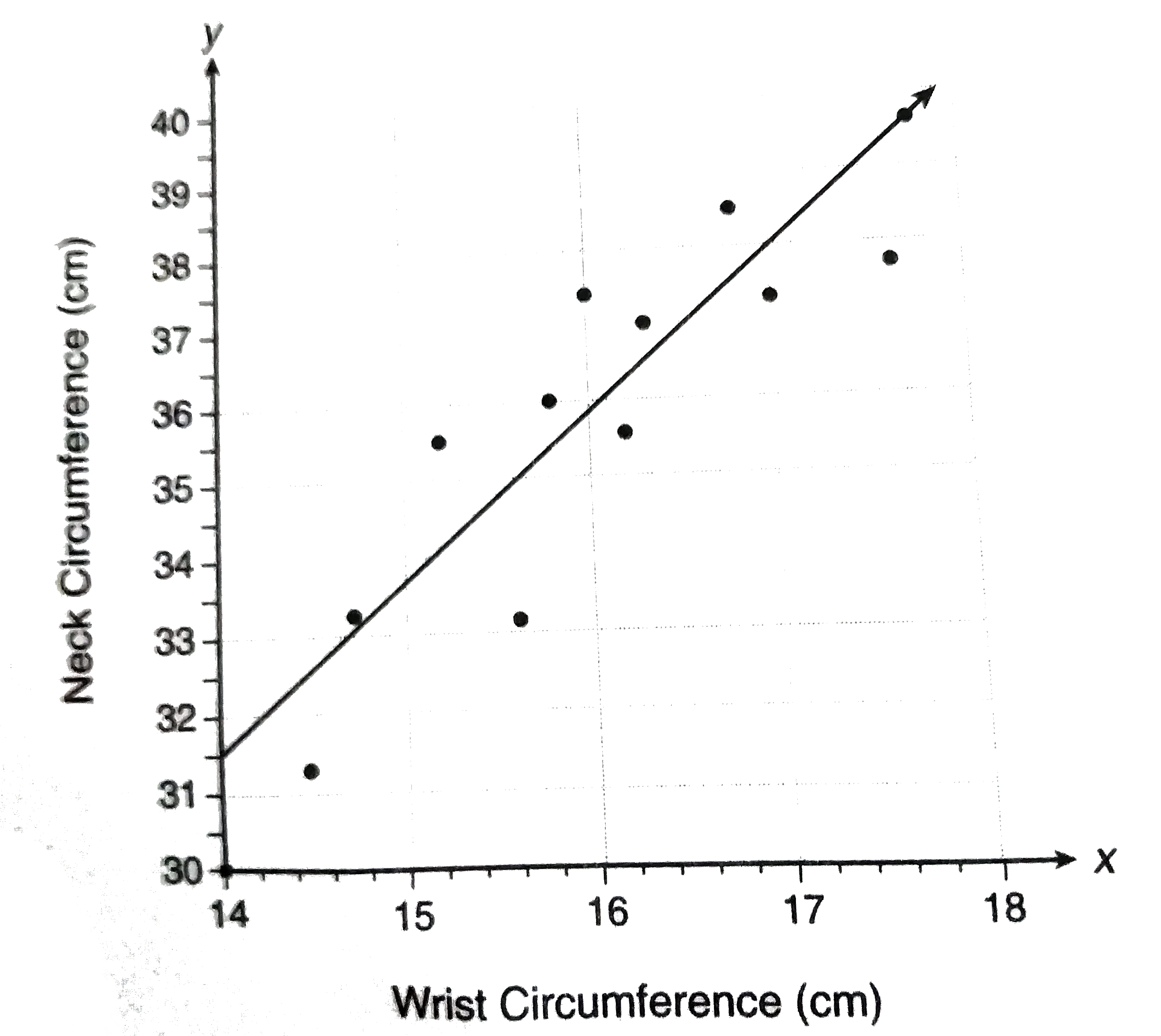
Question 1-3 refer to the above scatterplot, which shows wrist and neck cicumference measurements, in centimeters, for 12 people. The line of beat fit is drawn.
Q. What is the average increase in neck circumference per centimeter increase in wrist circumference, correct to the nearest tenth?View Solution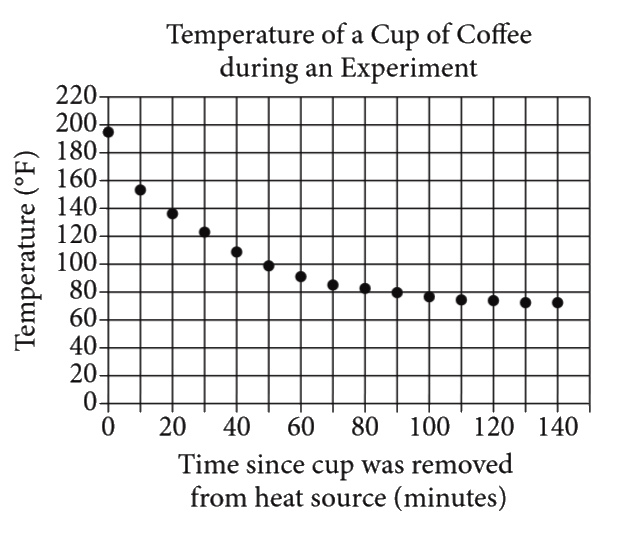
In an experiment, a heated cup of coffee is removed from a heat source, and the cup of coffee is then left in a room that is kept at a constant temperature. The graph above shows the temperature, in degrees Fahrenheit (.∘F), of the coffee immediately after being removed from the heat source and at 10-minute intervals thereafter.
During which of the following 10-minute intervals does the temperature of the coffee decrease at the greatest average rate?View Solution
Knowledge Check
- Question 1 - Select One
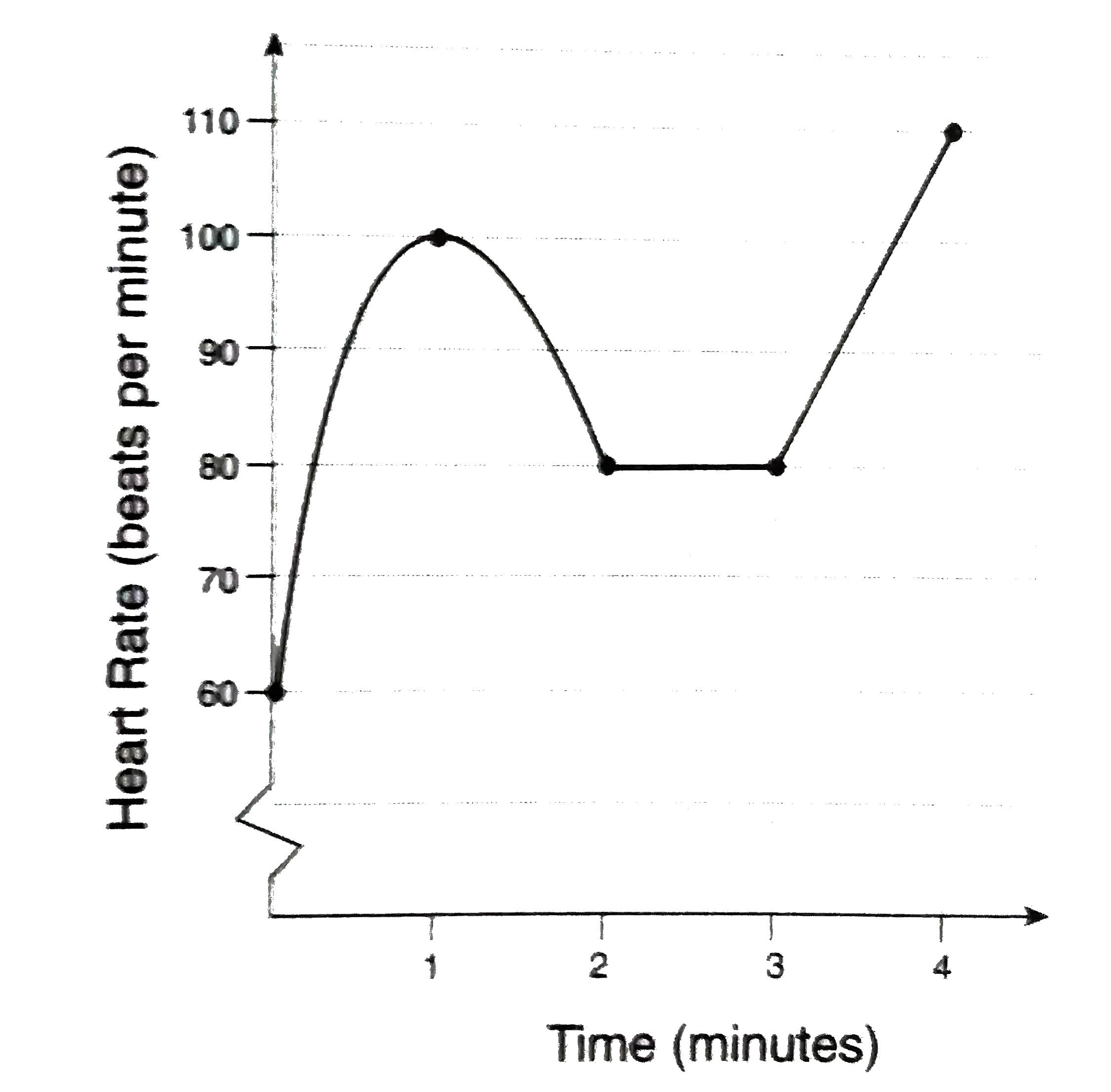
Question 13 and 14 refer to the gaph above which shows the heart rate, in veats per minutes, of a jogger during a 4-minutes interval.
Q. Overr what interval of time, in minutes, was the jogger's heart rate changing at a constant rate?A0 to 1B1 to 2C2 to 3D3 to 4 - Question 2 - Select One
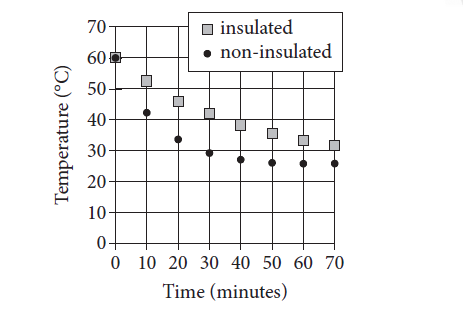
Two samples of water of equal mass are heated to 60 degrees Celsius (°C). One sample is poured into an insulated container, and the other sample is poured into a non-insulated container. The samples are then left for 70 minutes to cool in a room having a temperature of 25°C. The graph above shows the temperature of each sample at 10-minute intervals. Which of the following statements correctly compares the average rates at which the temperatures of the two samples change?AIn every 10-minute interval, the magnitude of the rate of change of temperature of the insulated sample is greater than that of the non-insulated sample.BIn every 10-minute interval, the magnitude of the rate of change of temperature of the non-insulated sample is greater than that of the insulated sample.CIn the intervals from 0 to 10 minutes and from 10 to 20 minutes, the rates of change of temperature of the insulated sample are of greater magnitude, whereas in the intervals from 40 to 50 minutes and from 50 to 60 minutes, the rates of change of temperature of the non-insulated sample are of greater magnitude.DIn the intervals from 0 to 10 minutes and from 10 to 20 minutes, the rates of change of temperature of the non-insulated sample are of greater magnitude, whereas in the intervals from 40 to 50 minutes and from 50 to 60 minutes, the rates of change of temperature of the insulated sample are of greater magnitude. - Question 3 - Select One
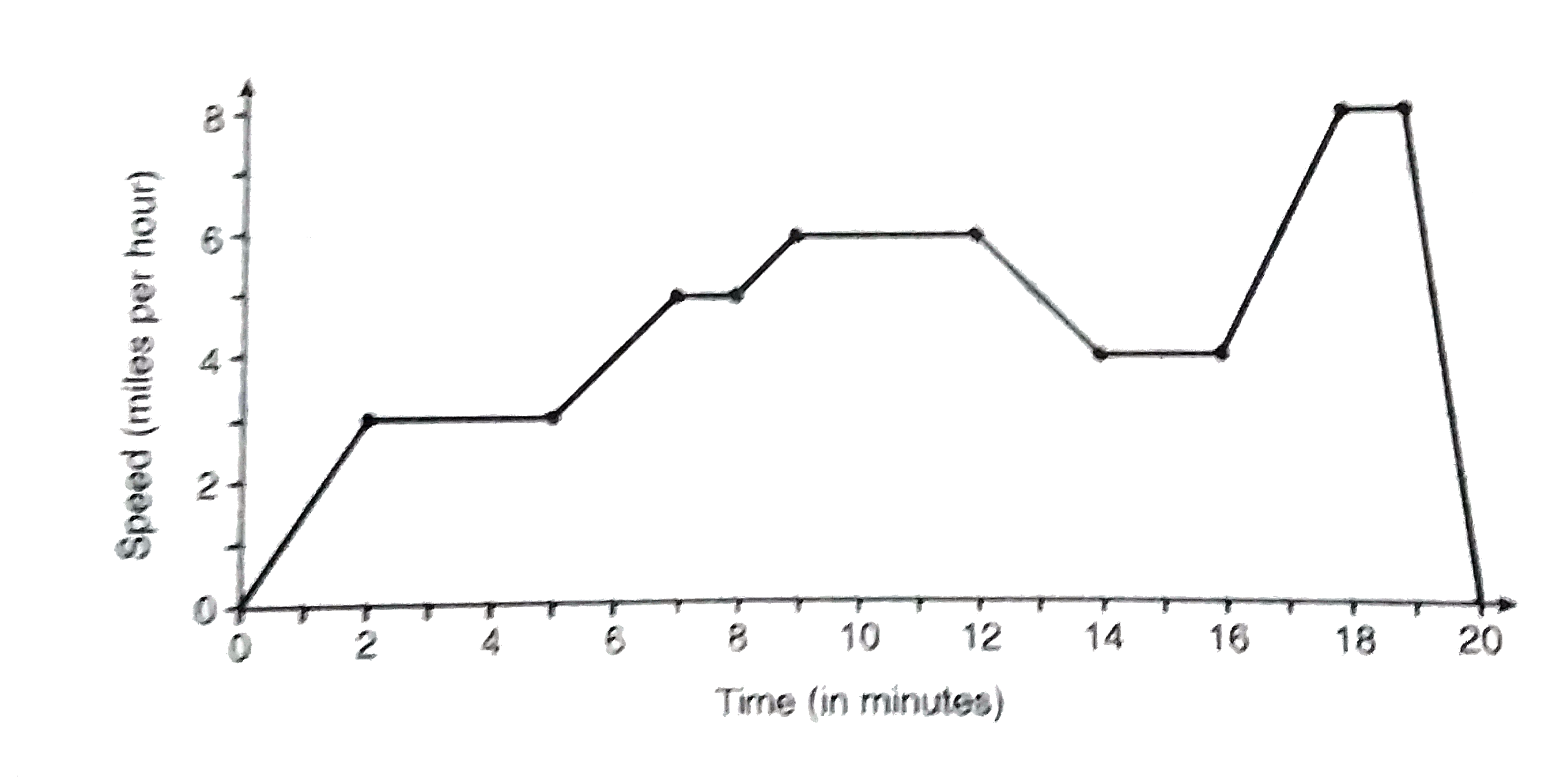
The graph above represents a jogger's speed during her 20-minutes jog around her neighbourhood. Which statement best describes what the jogger was doing during the 9-12 minutes interval of her jog?AShe was standing stillBShe was increasing her speedCShe was decreasing her speedDShe was jogging at a constant rate
A certain drug raises a patient's heart rate, h, in beats per minute, according to the equation h(x)=65+0.2x, where x is the number of milligrams of the drug in the patient's bloodstream. After t hours, the level of the drug in the patient's bloodsteam decrease exponentially according to the equation x(t)=512(0.7)t. After 5 hours, what is the number of beats per minute in the patient's heart rate, correct to the nearest whole number?
View SolutionThe side of a square sheet is increasing at the rate of 4cm per minute. At what rate is the area increasing when the side is 8 cm long?
View SolutionThe side of a square sheet is increasing at the rate of 4cm per minute. At what rate is the area increasing when the side is 8 cm long?
View SolutionWhen there are x milligrams of a certain drug in a patient's bloodstream, a patient's heart rate, h, in beats per minute, can be modeled by the equation h=60+0.5x. Which statements are true?
I. 10 minutes after taking the drug, the patient's heart rate increase to 75 beats per minute.
II. When the drug is not in the bloodstream, the patient's heart rate is 70 beats per minute.
III. For each 10 milligram increase of the drug in the patient's bloodstream, the patient's heartbeat increase 5 beats per minute.View SolutionJohn runs at different speeds as part of his training program. The graph shows his target heart rate at different times during his workout. On which interval is the target heart rate strictly increasing then strictly decreasing?
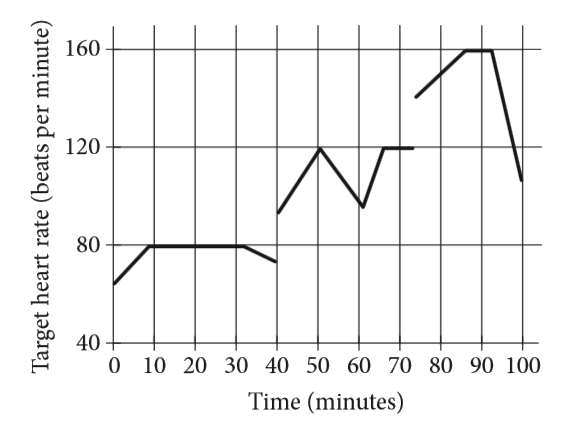 View Solution
View Solution

